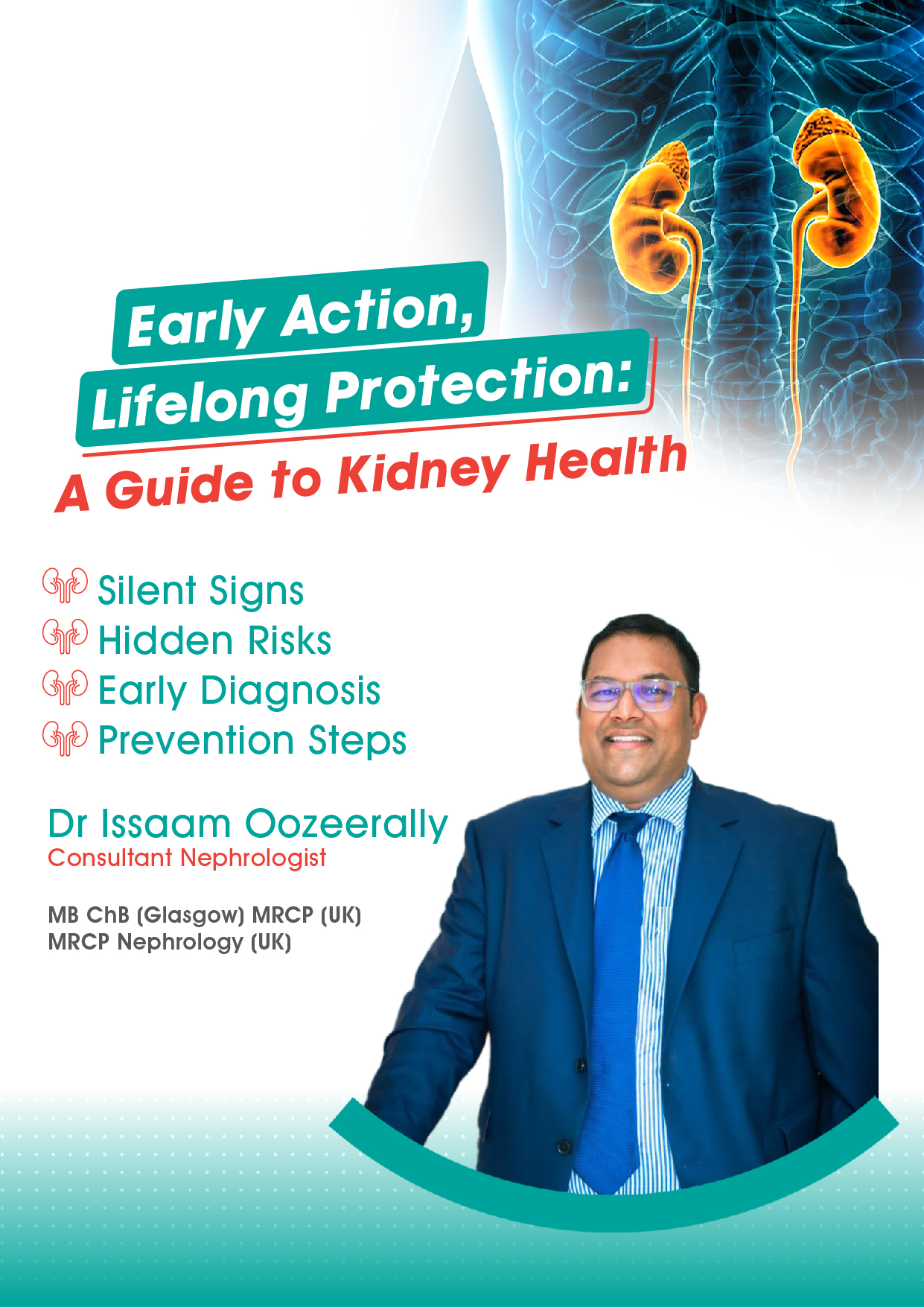
Early Action, Lifelong Protection: A Guide to Kidney Health
Kidney disease remains a stealthy, life-altering threat, often undiagnosed until irreversible damage occurs. A global public health issue, its silent progression underscores the critical need for awareness and early intervention. Dr. Oozeerally Issaam a leading nephrologist, addresses some pressing questions about prevention, risks and daily care; highlighting how simple, informed choices today can safeguard this vital organ system for tomorrow.
- Why is kidney disease termed a “silent” condition, and what makes early detection challenging?
The challenge with kidney disease is its subtlety. Early symptoms are usually not present. As the disease progresses, tiredness can be a symptom. One can easily blame this on a busy lifestyle. However, tiredness can signal toxin build-up when kidneys are not filtering blood properly. Changes in one’s urinary habits such as a foamy urine or waking up multiple times at night to pass urine are potential pointers towards an underlying kidney issue. Swelling around the eyes or ankles, shortness of breath from fluid in the lungs, or even a metallic taste in the mouth due to waste accumulation are all clues. The trouble is people often blame these symptoms on poor sleep, indigestion or standing all day. Hence, awareness and proactive check-ups allow for early detection.
- Beyond diabetes and hypertension, what lesser-known risk factors should people be aware of?
Genetics play a role. If a parent or sibling has kidney disease, your risk rises, even without diabetes. A certain disease called polycystic kidney disease; which eventually to leads to kidney failure; is known to impact multiple members of the family across different generations. Autoimmune conditions like lupus can directly target the kidneys. Recurrent urine infections or kidney stones can cause lasting damage. Lifestyle choices matter too: smoking restricts blood flow to the kidneys and obesity strains their function. Even common habits, like using painkillers such as ibuprofen or unregulated herbal supplements, can silently harm the organs and cause kidney failure.
- For someone with risk factors like diabetes, how often should they be screened?
This would depend on the level of kidney function. At the very minimum, annual testing is recommended. This includes a blood pressure check, a urine test for protein and a blood test to measure creatinine levels. If someone has multiple risk factors like diabetes and a family history, screenings every six months are wise. However, if symptoms like sudden swelling or unexplained nausea arise, testing immediately is recommended. Early intervention is geared towards slowing down the progression of the disease.
- Are there over-the-counter medications (e.g., NSAIDs) or supplements that could harm kidneys and how can they be used safely?
NSAIDs like ibuprofen are a double-edged sword. They are excellent for pain relief but can reduce blood flow to the kidneys, especially with chronic use. Herbal supplements are another minefield. Many contain unlisted toxins – aristolochic acid, for example, is a known kidney toxin found in some traditional remedies. Even high-dose vitamins, like vitamin C or D, can contribute to kidney stones.
Always consult a pharmacist or GP before starting new supplements and never exceed recommended doses.
- If a patient is diagnosed with early-stage kidney disease, what steps can they take?
It’s a holistic effort. Tight blood pressure and blood sugar control are the twin pillars of kidney protection. Dietary changes are equally vital: reducing salt intake to under 2 grams daily, moderating protein consumption and adjusting potassium or phosphorus intake based on blood tests. Regular exercise helps maintain a healthy weight and cardiovascular health, which indirectly supports the kidneys. Medications like ACE inhibitors and more recently SGLT2 inhibitors can help to preserve function. But perhaps most importantly, stay hydrated with water (not fizzy drinks or excessive caffeine) and avoid smoking.
- How does stress or mental health impact kidney function and what can be done to manage this?
Stress triggers a cascade of effects. It raises cortisol levels, which can spike blood pressure which is harmful to kidneys. People under stress might also neglect their diet, skip medications or turn to smoking or alcohol. Mindfulness practices such as yoga or meditation offer measurable benefits for both mental and physical health. Prioritising sleep and seeking support from friends or therapists can break this cycle. Kidney health isn’t just about the body—it’s about the mind too.
- What advice would you give to individuals looking to protect their kidney health long-term?
Knowledge is power; understand your risks, advocate for regular screenings and question the safety of “harmless” habits like long-term painkiller use or trendy supplements. Small consistent choices, like opting for a walk over scrolling through emails, choosing vegetables over processed snacks, add up. I urge everyone to have a conversation with their GP about their kidney health. And if you’re a parent, teach your children the importance of hydration and balanced eating. Healthy kidneys begin with a proactive mindset.
About Dr Issaam Oozeerally
MB ChB (Glasgow) MRCP (UK) MRCP Nephrology (UK)
Consultant Nephrologist
Dr Oozeerally graduated from the University of Glasgow in 2008. After completing his internship of two years in Scotland, he moved to England to complete his MRCP in 2012. Following this, he started his training in Nephrology and General Internal Medicine in 2013 in Leicester and the East Midlands which he completed in 2018. After that, he decided to return to Mauritius as there is a lack of Nephrologists here. He remains registered with the General Medical Council of the UK as a Nephrologist.
In Mauritius, he started working in a dialysis unit in Quatre Bornes for a few months in September 2018. Subsequently from February 2019 to December 2021, he worked as a Nephrologist for the Ministry of Health and Wellness based at Jawaharlall Nehru Hospital. Since January 2022, he is a Self-employed working across different sites in the private healthcare sector.

